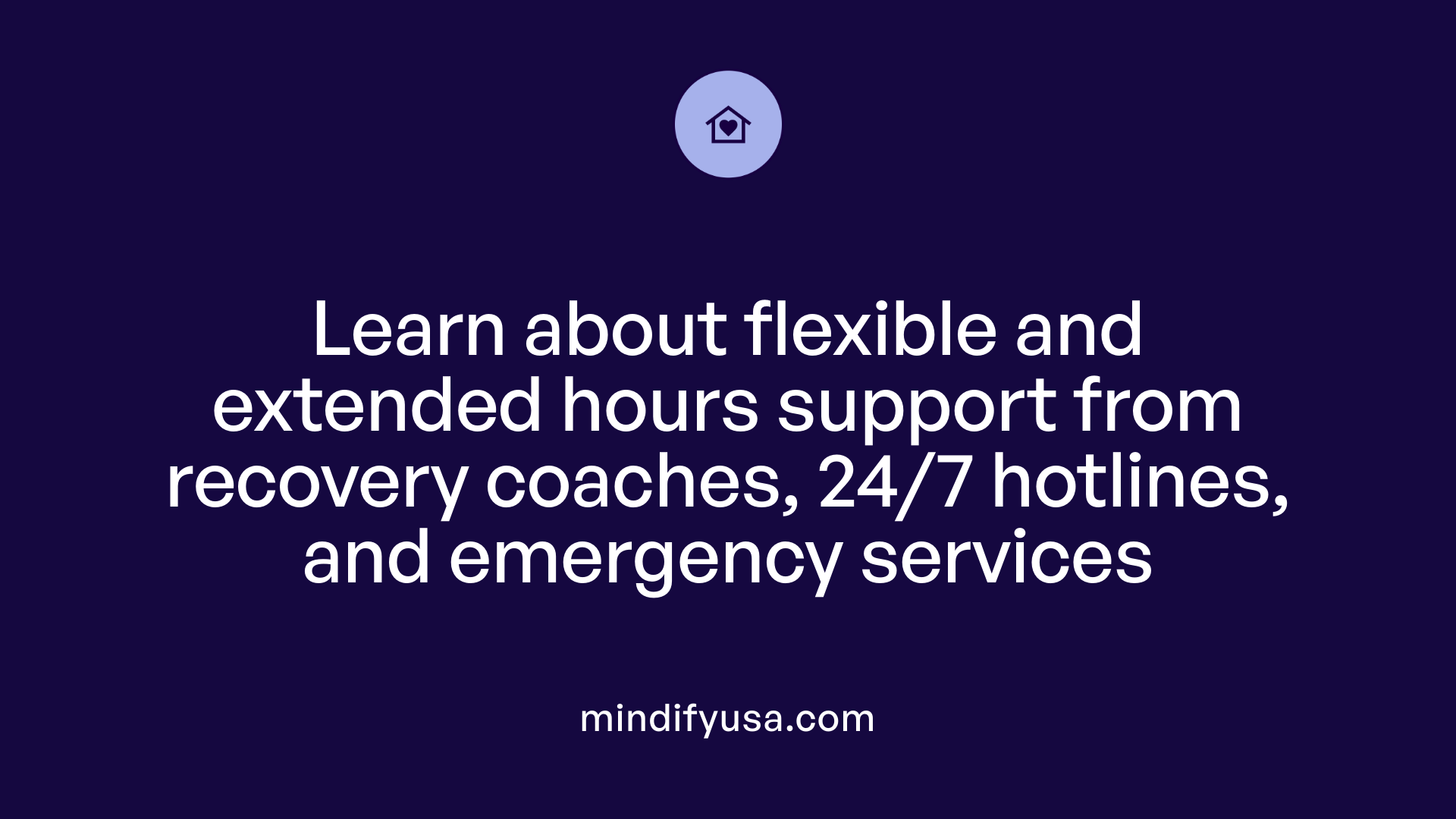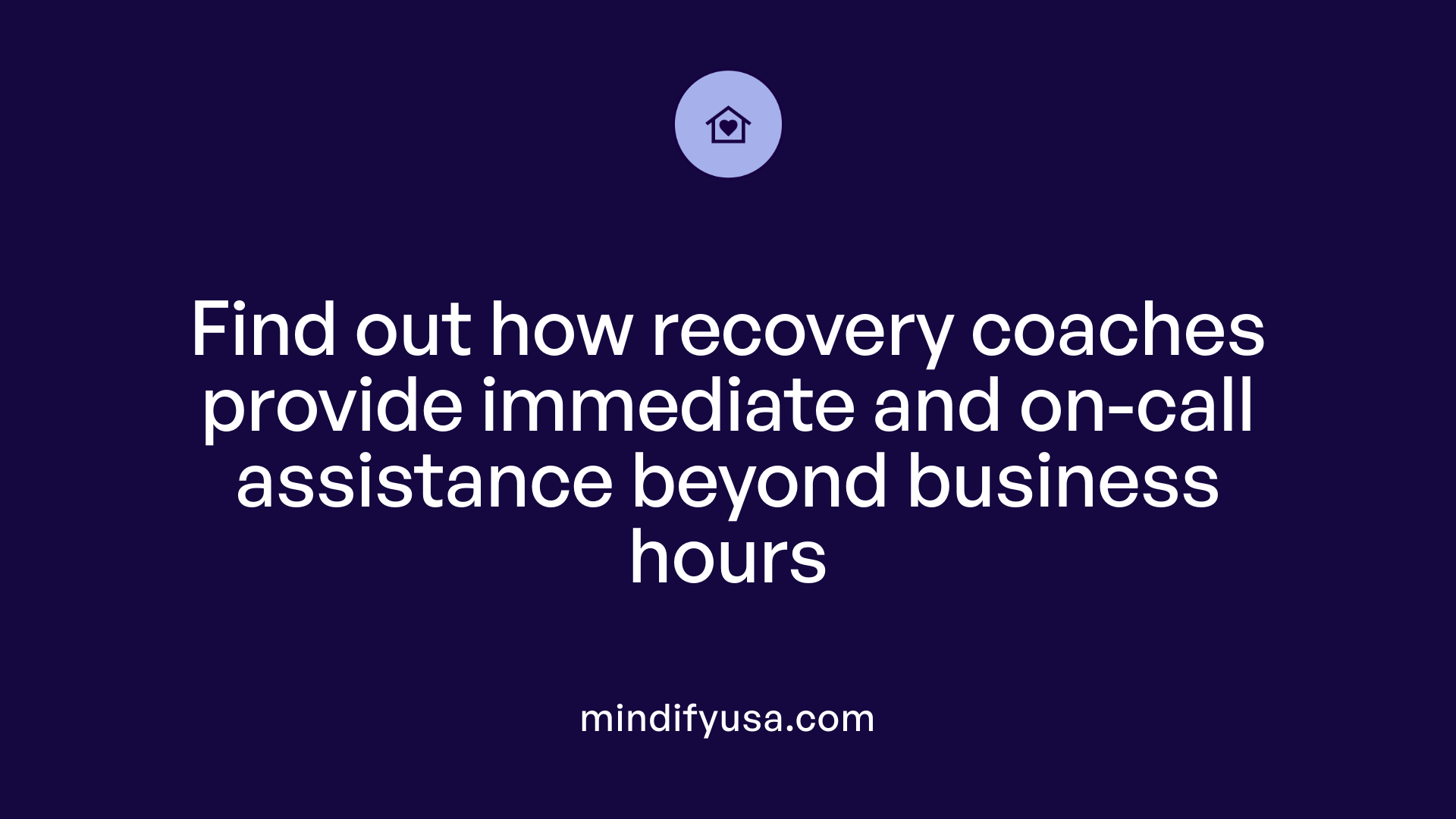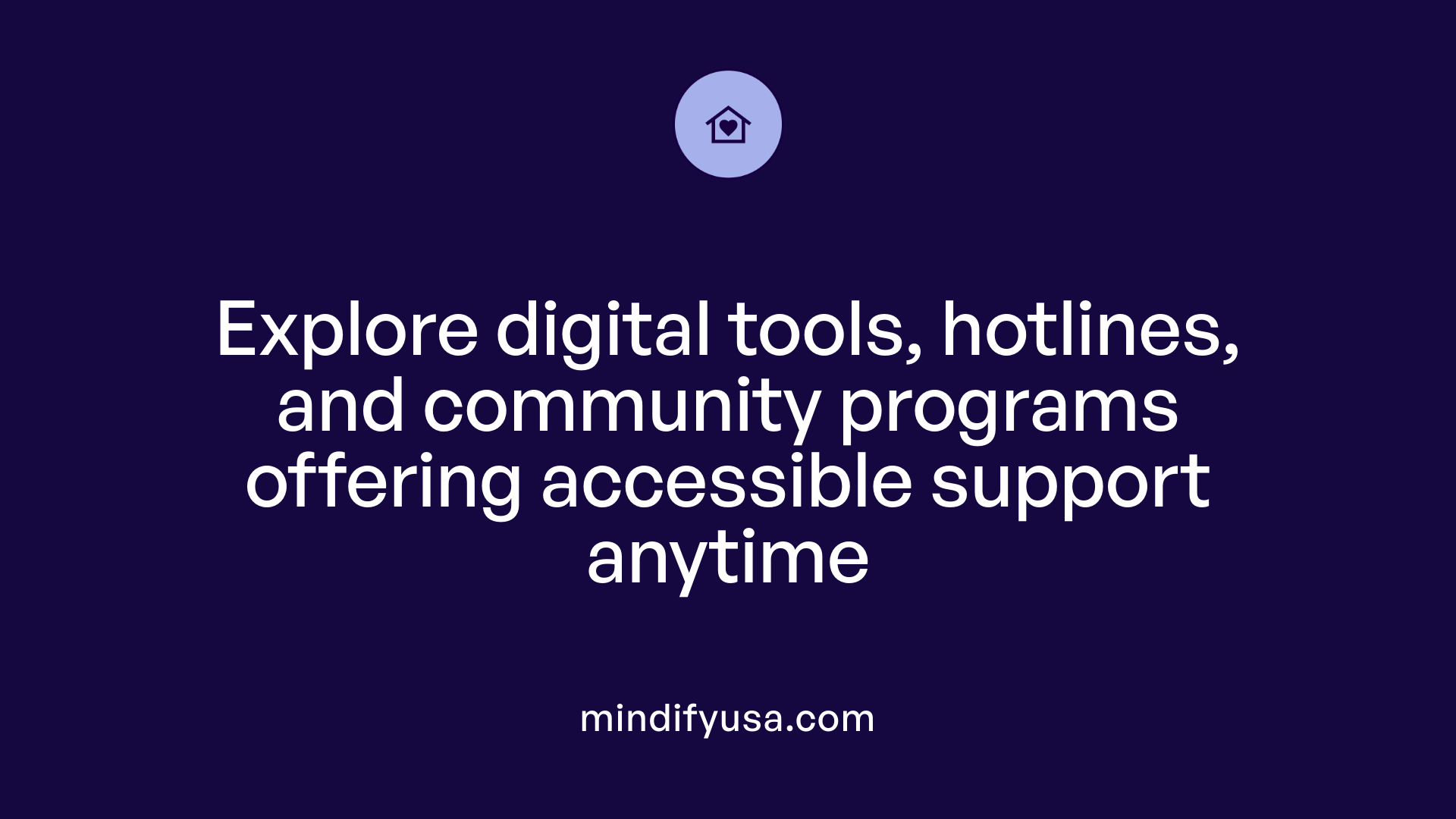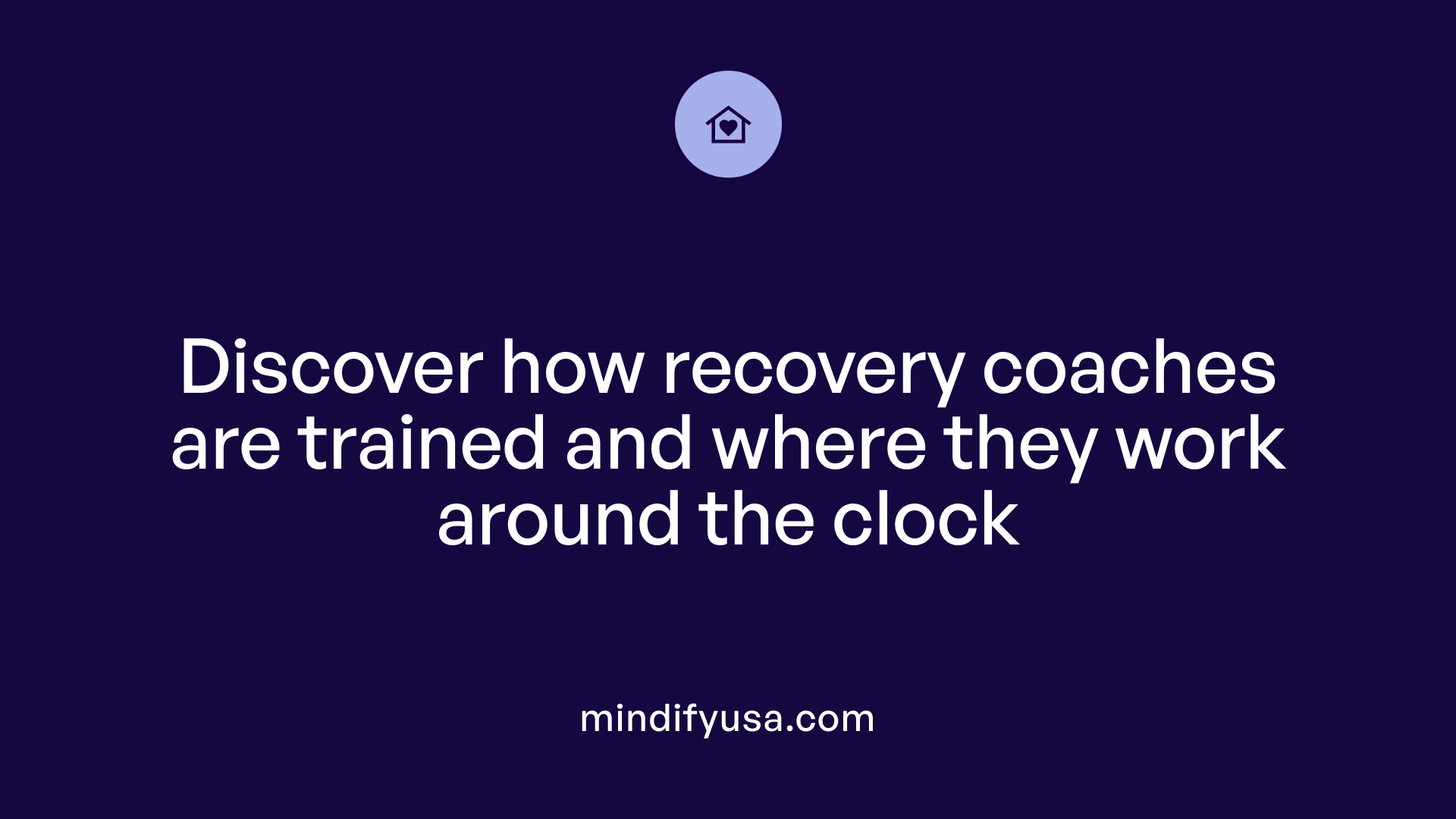Understanding Access to Recovery Coaches After Hours
Recovery coaching plays a vital role in supporting individuals through their journey of sobriety and behavioral health recovery. One common concern is whether these services are available outside regular working hours, such as evenings, weekends, or around the clock. This article delves into the availability of recovery coaches after hours, the types of support they offer, and how individuals can access immediate help when needed.
Availability of Recovery Coaches After Business Hours

Is recovery coaching available outside of regular business hours?
Recovery coaching services are becoming more flexible to meet the needs of individuals seeking support at different times of the day. Many organizations offer services that extend beyond typical office hours, including evenings, weekends, and even 24/7 support options.
Some programs provide virtual sessions through phone or online platforms, allowing individuals to access support whenever they need it most. For example, services such as the BCOR Hotline operate 24/7, staffed by experienced recovery coaches who offer immediate assistance, referrals, and emotional support at any hour.
Additionally, recovery programs like OORP (Outreach and Overdose Recovery Program) deploy trained recovery coaches to hospitals and community settings around the clock. They provide ongoing support for up to 60 days after overdose incidents, ensuring continuous availability for individuals in crisis.
Certain organizations explicitly cater to after-hours needs by being on-call or providing flexible scheduling. Reach for Recovery's Peer Recovery Coaches, for example, are available to work non-traditional hours and remain on-call to support individuals during crises or relapses.
Furthermore, employment in various settings such as hospitals, law enforcement, and community centers often involves on-call duties, allowing recovery coaches to be accessible outside of standard business times. The availability of recovery coaching outside normal hours underscores the importance of timely support in addiction recovery.
Visiting websites and contacting specific service providers directly is the best way to confirm their current hours and support options. Overall, accessible and flexible recovery coaching services are crucial to successfully supporting individuals at any time.
| Service Provider | Availability | Support Type | Additional Notes |
|---|---|---|---|
| BCOR Hotline | 24/7 | Peer support, referrals, hotline | Immediate crisis assistance |
| OORP | 24/7 support at hospitals | Post-overdose follow-up | Ongoing care for up to 60 days |
| Reach for Recovery | Non-traditional hours, on-call support | Peer support during crises | Available for relapses and emergencies |
| Various community agencies | Flexible, often after hours for appointments | Individual and group coaching | Based on organizational policies |
Remember, specific hours and support options may vary between providers. Checking directly with each organization will ensure you receive the most accurate and current information.
Immediate and On-Call Support Options

Can recovery coaches provide immediate or on-call support after hours?
Yes, recovery coaches can offer immediate or on-call support outside of regular business hours. Many programs employ trained recovery coaches to be accessible during evenings, weekends, and even through 24/7 helplines. For instance, the BCOR Hotline is a dedicated peer recovery support line staffed by experienced recovery coaches available around the clock, providing not only emotional support but also referrals to treatment facilities, shelters, and recovery meetings.
Recovery coaches working in healthcare settings, such as hospitals and community clinics, often support patients and their families outside typical hours, especially in crisis situations. Additionally, organizations like Reach for Recovery have on-call recovery coaches ready to assist during emergencies, including relapse or overdose crises.
Beyond human services, digital tools have expanded support availability. Amber AI is an on-demand digital recovery coaching service that offers instant guidance and answers to users’ questions 24/7. This kind of digital platform ensures that individuals can access support whenever they need it, without geographic or time restrictions.
Furthermore, many recovery coaching programs are integrating virtual meetings and messaging as standard practice, allowing individuals to connect with coaches through phone calls, video chats, or texts at any hour. This approach enhances accessibility and responsiveness during critical moments.
In summary, while traditional recovery coaching services often operate during standard hours, several options now provide immediate and on-call assistance through dedicated hotlines, in-person collaborations, and innovative digital platforms, ensuring timely support for individuals in need.
Support Platforms and How to Access Them

What is the difference between a recovery coach and a substance abuse counselor?
A recovery coach primarily offers non-clinical, peer-based guidance aimed at motivating individuals, setting recovery goals, and connecting them with community resources. They often share lived experiences of recovery, providing support that fosters resilience and a positive outlook. Recovery coaches are generally not licensed clinicians, and their services are flexible, often occurring in various community settings or even in clients' homes.
In contrast, a substance abuse or addiction counselor is a licensed health professional with formal training in clinical methods to diagnose and treat addiction. They address underlying mental health issues through evidence-based therapies and often work within clinical or therapeutic environments. Their qualifications include advanced degrees, clinical certification, and adherence to strict ethical standards.
While recovery coaches focus on maintaining behavioral changes and reintegration into the community, counselors provide comprehensive treatment that addresses mental health co-occurring issues. Both roles are vital in a person’s recovery journey but serve different purposes within the spectrum of addiction support.
The Role and Training of Recovery Coaches in Providing 24/7 Support

How much does a recovery coach charge?
The cost associated with recovery coaching varies based on multiple factors, including the coach’s experience, the specific services offered, and the geographical location. On average, recovery coaches charge between $50 and $150 per hour. Some coaches or organizations offer package deals that can make ongoing support more affordable.
For specialized services like sober coaching or 24/7 sober companions, prices can escalate significantly, ranging from around $750 to over $2,500 per day. These services are often used in critical recovery phases or crisis situations.
Training and obtaining credentials as a recovery coach also involve costs. The expenses for training programs can range from $600 to over $10,000, covering courses, exams, and ongoing professional development. Consequently, embarking on a career in recovery coaching can require a substantial initial investment.
Overall, the total financial commitment for recovery coaching depends on the individual’s needs—whether they seek short-term guidance or long-term, continuous support. Many programs, including those in Colorado, enable trained recovery coaches to work in various settings and sometimes offer this service at no cost to the client.
How are recovery coaches trained and where do they work?
Recovery Coaches typically undergo comprehensive training programs, such as those offered by Embark Peer Coach Academy or Advocates for Recovery Colorado. These training courses often include 30 hours of coursework on ethics, professionalism, and recovery strategies. Certification standards are set by organizations like the International Certification & Reciprocity Consortium (IC&RC), and passing a certification exam is a requirement.
To qualify as a recovery coach, individuals must complete supervised work hours—generally around 500—and participate in ongoing training and supervision. This prepares them to support peers across multiple environments.
Recovery coaches are employed in diverse settings including hospitals, treatment facilities, community-based organizations, law enforcement agencies, and peer-run recovery centers. They can also participate in programs like the Colorado’s Recovery Community Organization, which is nationally accredited, and offer group support through meetings such as Recovery Dharma or CRAFT Family Support, often accessible online and in person.
Is there potential for flexible or after-hours positions?
While official training modules do not specify exact hours of availability, many recovery coaching jobs accommodate flexible or after-hours support. Organizations like Reach for Recovery and the BCOR Hotline provide 24/7 peer recovery support and emergency referrals, indicating opportunities for coaches to work outside regular hours.
Coaches working in hospitals or opioid overdose response programs (OORP) often provide immediate, around-the-clock support to individuals experiencing crises or following overdose incidents. Additionally, peer recovery support hotlines and crisis services are staffed by trained coaches who are available on-call 24/7.
In summary, recovery coaching as a career often involves roles that can include nights, weekends, and emergency support, depending on the organization’s needs. The flexibility allows coaches to respond when most needed and provides vital assistance to those in critical moments of recovery.
Ensuring Accessibility to Recovery Support Anytime
The availability of recovery coaches outside traditional office hours is increasingly common, with many organizations offering flexible scheduling, round-the-clock hotlines, and on-demand digital support. Whether through scheduled evening sessions, weekend support groups, or 24/7 emergency lines, individuals seeking recovery assistance have a variety of resources at their fingertips. It is essential for individuals to directly contact providers to understand their specific support hours and options for immediate help, ensuring that support is accessible whenever it is needed most.






































































































